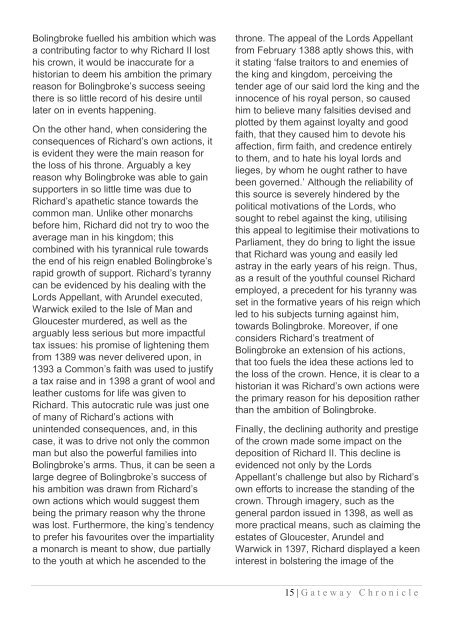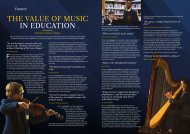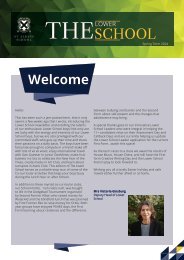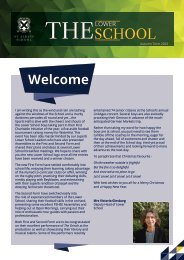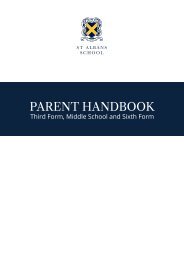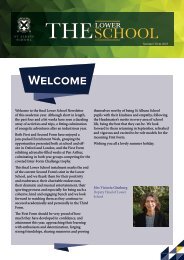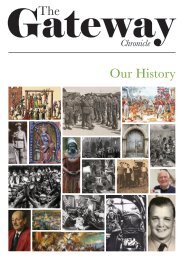Gateway Chronicle 2022
You also want an ePaper? Increase the reach of your titles
YUMPU automatically turns print PDFs into web optimized ePapers that Google loves.
Bolingbroke fuelled his ambition which was<br />
a contributing factor to why Richard II lost<br />
his crown, it would be inaccurate for a<br />
historian to deem his ambition the primary<br />
reason for Bolingbroke’s success seeing<br />
there is so little record of his desire until<br />
later on in events happening.<br />
On the other hand, when considering the<br />
consequences of Richard’s own actions, it<br />
is evident they were the main reason for<br />
the loss of his throne. Arguably a key<br />
reason why Bolingbroke was able to gain<br />
supporters in so little time was due to<br />
Richard’s apathetic stance towards the<br />
common man. Unlike other monarchs<br />
before him, Richard did not try to woo the<br />
average man in his kingdom; this<br />
combined with his tyrannical rule towards<br />
the end of his reign enabled Bolingbroke’s<br />
rapid growth of support. Richard’s tyranny<br />
can be evidenced by his dealing with the<br />
Lords Appellant, with Arundel executed,<br />
Warwick exiled to the Isle of Man and<br />
Gloucester murdered, as well as the<br />
arguably less serious but more impactful<br />
tax issues: his promise of lightening them<br />
from 1389 was never delivered upon, in<br />
1393 a Common’s faith was used to justify<br />
a tax raise and in 1398 a grant of wool and<br />
leather customs for life was given to<br />
Richard. This autocratic rule was just one<br />
of many of Richard’s actions with<br />
unintended consequences, and, in this<br />
case, it was to drive not only the common<br />
man but also the powerful families into<br />
Bolingbroke’s arms. Thus, it can be seen a<br />
large degree of Bolingbroke’s success of<br />
his ambition was drawn from Richard’s<br />
own actions which would suggest them<br />
being the primary reason why the throne<br />
was lost. Furthermore, the king’s tendency<br />
to prefer his favourites over the impartiality<br />
a monarch is meant to show, due partially<br />
to the youth at which he ascended to the<br />
throne. The appeal of the Lords Appellant<br />
from February 1388 aptly shows this, with<br />
it stating ‘false traitors to and enemies of<br />
the king and kingdom, perceiving the<br />
tender age of our said lord the king and the<br />
innocence of his royal person, so caused<br />
him to believe many falsities devised and<br />
plotted by them against loyalty and good<br />
faith, that they caused him to devote his<br />
affection, firm faith, and credence entirely<br />
to them, and to hate his loyal lords and<br />
lieges, by whom he ought rather to have<br />
been governed.’ Although the reliability of<br />
this source is severely hindered by the<br />
political motivations of the Lords, who<br />
sought to rebel against the king, utilising<br />
this appeal to legitimise their motivations to<br />
Parliament, they do bring to light the issue<br />
that Richard was young and easily led<br />
astray in the early years of his reign. Thus,<br />
as a result of the youthful counsel Richard<br />
employed, a precedent for his tyranny was<br />
set in the formative years of his reign which<br />
led to his subjects turning against him,<br />
towards Bolingbroke. Moreover, if one<br />
considers Richard’s treatment of<br />
Bolingbroke an extension of his actions,<br />
that too fuels the idea these actions led to<br />
the loss of the crown. Hence, it is clear to a<br />
historian it was Richard’s own actions were<br />
the primary reason for his deposition rather<br />
than the ambition of Bolingbroke.<br />
Finally, the declining authority and prestige<br />
of the crown made some impact on the<br />
deposition of Richard II. This decline is<br />
evidenced not only by the Lords<br />
Appellant’s challenge but also by Richard’s<br />
own efforts to increase the standing of the<br />
crown. Through imagery, such as the<br />
general pardon issued in 1398, as well as<br />
more practical means, such as claiming the<br />
estates of Gloucester, Arundel and<br />
Warwick in 1397, Richard displayed a keen<br />
interest in bolstering the image of the<br />
15 | G ateway <strong>Chronicle</strong>


